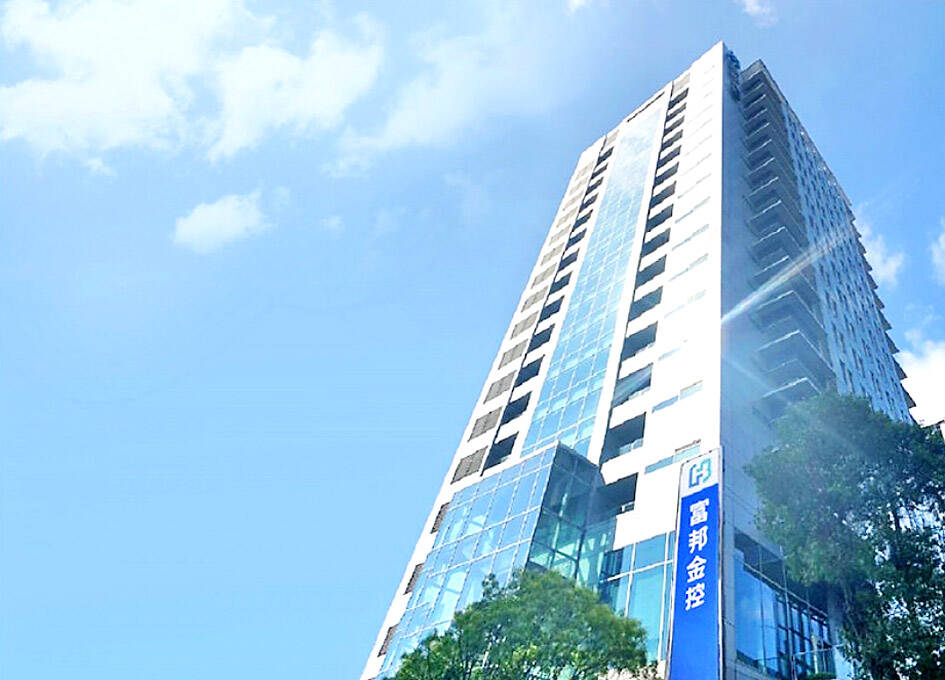The nation’s 14 listed financial holding companies last month reported a collective profit of NT$57.78 billion (US$1.76 billion), up 7.2 percent from a year earlier, although the Lunar New Year holiday reduced the number of business days.
The improvement reflected stable profit growth on the part of local financial institutions and most of them are expected to fare well this year, despite trade tensions between the US and the rest of the world.
Fubon Financial Holding Co (富邦金控) retained its top position, with net income of NT$15.21 billion, or earnings per share of NT$1.11, followed by Cathay Financial Holding Co’s (國泰金控) NT$14.49 billion, or NT$0.99 per share.

Photo courtesy of Fubon Financial Holding Co
Fubon Financial’s profit expanded 8 percent year-on-year, bolstered by NT$3.89 billion in contributions from Taipei Fubon Bank (台北富邦銀行), the conglomerate said in a statement.
Loan and deposit growth remained strong at 9 percent and 11 percent respectively, driving an 11 percent gain in net interest income, it said, adding that wealth management gathered traction, boosting fee income by 14 percent.
Fubon Life Insurance Co (富邦人壽) generated NT$730 million in net income, soaring 33 percent from a year earlier, aided by stable and healthy insurance operation and investment gains, it said.
Cathay Financial’s profit last month showed the fastest uptick of 54 percent from a year earlier, as its flagship unit, Cathay Life Insurance (國泰人壽), posted a net profit of NT$9.43 billion, up more than twofold from a year earlier, the group said.
In addition, Cathay United Bank (國泰世華銀行) delivered strong earnings of NT$4.25 billion, up 7.1 percent year-on-year, on the back of strong loan demand and lower foreign-currency funding costs, as well as better interest income and robust wealth management business, including insurance policies and mutual funds, it said.
CTBC Financial Holding Co (中信金控) placed third, with net income of NT$6.83 billion, while KGI Financial Holding Co (凱基金控) overtook state-run Mega Financial Holding Co (兆豐金控) to rank fourth with NT$3.66 billion of net income versus Mega Financial’s NT$3.22 billion.
Five conglomerates — SinoPac Financial Holdings Co (永豐金控), KGI Financial, E.Sun Financial Holding Co (玉山金控), First Financial Holding Co (第一金控) and Hua Nan Financial Co (華南金控) delivered record results for last month, their data showed.
Shin Kong Financial Holding Co (新光金控) was the only one in the red, posting losses of NT$1.88 billion, dragged by its main subsidiary Shin Kong Life Insurance Co (新光人壽), the company said in a statement.

UNCERTAINTY: Innolux activated a stringent supply chain management mechanism, as it did during the COVID-19 pandemic, to ensure optimal inventory levels for customers Flat-panel display makers AUO Corp (友達) and Innolux Corp (群創) yesterday said that about 12 to 20 percent of their display business is at risk of potential US tariffs and that they would relocate production or shipment destinations to mitigate the levies’ effects. US tariffs would have a direct impact of US$200 million on AUO’s revenue, company chairman Paul Peng (彭雙浪) told reporters on the sidelines of the Touch Taiwan trade show in Taipei yesterday. That would make up about 12 percent of the company’s overall revenue. To cope with the tariff uncertainty, AUO plans to allocate its production to manufacturing facilities in

Taiwan will prioritize the development of silicon photonics by taking advantage of its strength in the semiconductor industry to build another shield to protect the local economy, National Development Council (NDC) Minister Paul Liu (劉鏡清) said yesterday. Speaking at a meeting of the legislature’s Economics Committee, Liu said Taiwan already has the artificial intelligence (AI) industry as a shield, after the semiconductor industry, to safeguard the country, and is looking at new unique fields to build more economic shields. While Taiwan will further strengthen its existing shields, over the longer term, the country is determined to focus on such potential segments as

TAKING STOCK: A Taiwanese cookware firm in Vietnam urged customers to assess inventory or place orders early so shipments can reach the US while tariffs are paused Taiwanese businesses in Vietnam are exploring alternatives after the White House imposed a 46 percent import duty on Vietnamese goods, following US President Donald Trump’s announcement of “reciprocal” tariffs on the US’ trading partners. Lo Shih-liang (羅世良), chairman of Brico Industry Co (裕茂工業), a Taiwanese company that manufactures cast iron cookware and stove components in Vietnam, said that more than 40 percent of his business was tied to the US market, describing the constant US policy shifts as an emotional roller coaster. “I work during the day and stay up all night watching the news. I’ve been following US news until 3am

COLLABORATION: Given Taiwan’s key position in global supply chains, the US firm is discussing strategies with local partners and clients to deal with global uncertainties Advanced Micro Devices Inc (AMD) yesterday said it is meeting with local ecosystem partners, including Taiwan Semiconductor Manufacturing Co (TSMC, 台積電), to discuss strategies, including long-term manufacturing, to navigate uncertainties such as US tariffs, as Taiwan occupies an important position in global supply chains. AMD chief executive officer Lisa Su (蘇姿丰) told reporters that Taiwan is an important part of the chip designer’s ecosystem and she is discussing with partners and customers in Taiwan to forge strong collaborations on different areas during this critical period. AMD has just become the first artificial-intelligence (AI) server chip customer of TSMC to utilize its advanced